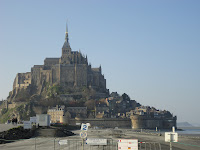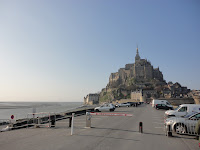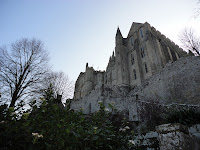With one weekend trip, two essays, three final exams, and just under four weeks of work and classes remaining, the inevitable is seeming imminent: the end of my semester in Geneva is coming. I have been dreading the 8th of May since the instant that I stepped into the car to drive with my parents to Newark International Airport to come here in the beginning of January. The anticipation, the uncertainty, the excitement -- I had the travel bug before I even left. And it has gotten way stronger during my stay in Switzerland. As I begin to wind down here and prepare for the trip home, I have been thinking just a little bit deeper about what ways I have changed over the course of these last few months.
Politics are the first thing my mind tends to go to and I have begun to make a little more sense of things. Or at least origins of things -- naturally there is no solution. But I come away with a deeper understanding of what it means to be American by being able to compare and contrast with the European model first-hand. Many European societies were developed from a feudal model, meaning there was a lord who owned all of the land, and he partitioned it out to peasants for them to farm. They would also tend his private land and grow and harvest his crops, and in return he guarenteed their protection. The average citizen was dependent on his lord for everything, and they knew that there was no vote for power, and virtually no hope for upward class mobility.
In the newly settled North American continent on the other hand, there were three things that would keep one alive: competent survival capabilities, faith in God, and a gun. From the very beginning (at least in the southern colonies), disease and hunger were rampant, and clashes with the Native Americans were frequent -- only the strongest and most cunning survived. As colonies began to grow and people began to venture westward, whole families were moved into land that was totally unexplored by white people. If one of the strong adults broke a bone, got sick, or died, the chances of the whole family dying were very high. But people took these chances, because there was the opportunity to find your wealth, own your land, and to move up in society. And the fact that there was so much land that seemed open for the taking, meant that people settled on huge plots, often miles and miles from their nearest neighbor. This is a sharp contrast to the manors of Europe where one's plot was measured in square meters, not miles, and neighbors were within talking distance. People assisted eachother more in the manor, whereas on the Great Plains, one helped his or herself. The indivitualistic and self-reliant American spirit was forged.
So with the history of feudal society in Europe, is it any surprise that it was the birthplace and is still the fore-running continent when it comes to social welfare and entitlements? People looking up to their lord (played in this era by a representative government) for support and a safety net is not a new thing in Europe. But it is still relatively new in America. Is it also so hard to believe that so many Americans have such deeply rooted opposition to the concept of governmental social welfare programs?
Times have changed, the West has been tamed, and in most places we go in our day to day lives, most of us do not need to worry about gangs of outlaws or savage natives. And we are in a closer, more interconnected society where cooperation and compassion have to be a part of life. All Americans, poor and wealthy alike, need to re-find the charitable, philanthropic spirit that was possessed by the great families, like the Mellons, the Carnagies, and Rockefellers, because those are good and inspiring members of America's history. That will be what increases social welfare in America. Because doing it the other way, the forced Government way, has never been the American way.
Geneva Semester: Spring 2011
Friday, April 15, 2011
Monday, March 28, 2011
Bayeux, Brittany, Toulouse
Captions and reflections to follow...
 |
| Adrianne, cafe in Bayeux |
 |
| Croque Madame Sandwich |
 |
| Bayeux |
 |
| Bayeux |
 |
| Bayeux |
 |
| Bayeux |
 |
| Bayeux |
 |
| Cathédrale Notre-Dame de Bayeux |
 |
| Me in Bayeux |
 |
| Cathédrale Notre-Dame de Bayeux |
 |
| Cathédrale Notre-Dame de Bayeux |
 |
| Cathédrale Notre-Dame de Bayeux |
 |
| Cathédrale Notre-Dame de Bayeux |
 |
| Organ at the Cathédrale Notre-Dame de Bayeux |
 |
| Cathédrale Notre-Dame de Bayeux |
 |
| Cathédrale Notre-Dame de Bayeux |
 |
| Cathédrale Notre-Dame de Bayeux |
 |
| Cathédrale Notre-Dame de Bayeux |
 |
| Crypt |
 |
| Cathédrale Notre-Dame de Bayeux |
 |
| Cathédrale Notre-Dame de Bayeux |
 |
| Cathédrale Notre-Dame de Bayeux |
 |
| Cathédrale Notre-Dame de Bayeux |
 |
| Bayeux |
 |
| Normandy |
 |
| Mont-St-Michel in the distance |
 |
| Mont-St-Michel |
 |
| Mont-St-Michel |
 |
| Mont-St-Michel |
 |
| Adrianne, Mont-St-Michel |
 |
| Mont-St-Michel |
 |
| Mont-St-Michel |
 |
| Mont-St-Michel |
 |
| Mont-St-Michel |
 |
| Mont-St-Michel |
 |
| Mont-St-Michel |
 |
| Mont-St-Michel |
 |
| Mont-St-Michel |
 |
| Mont-St-Michel |
 |
| Mont-St-Michel |
 |
| Mont-St-Michel |
 |
| Mont-St-Michel |
 |
| Mont-St-Michel |
 |
| Mont-St-Michel |
 |
| Mont-St-Michel |
 |
| Mont-St-Michel |
 |
| Mont-St-Michel |
 |
| Mont-St-Michel |
 |
| Mont-St-Michel |
 |
| Mont-St-Michel |
 |
| Mont-St-Michel |
 |
| Mont-St-Michel |
 |
| Mont-St-Michel |
 |
| Mont-St-Michel |
 |
| Mont-St-Michel |
 |
| Town in Brittany |
 |
| Town in Brittany |
 |
| Hotel in Brittany |
 |
| View from our Hotel |
 |
| View from our Hotel |
 |
| Bordeaux |
 |
| Cognac |
 |
| Bordeaux Vineyards |
 |
| Bergerac, of Cyrano fame |
 |
| Drive to Southern France |
 |
| Bordeaux Vineyards |
 |
| Beautiful town of Condom |
 |
| Our wonderful little Citroen |
 |
| Toulouse |
 |
| Toulouse |
 |
| Toulouse |
 |
| Toulouse |
 |
| Toulouse |
 |
| Toulouse |
 |
| Toulouse |
 |
| Toulouse |
 |
| Cathédrale Saint-Étienne de Toulouse |
 |
| Cathédrale Saint-Étienne de Toulouse |
 |
| Cathédrale Saint-Étienne de Toulouse |
 |
| Cathédrale Saint-Étienne de Toulouse |
 |
| Cathédrale Saint-Étienne de Toulouse |
 |
| Cathédrale Saint-Étienne de Toulouse |
 |
| Cathédrale Saint-Étienne de Toulouse |
 |
| Cathédrale Saint-Étienne de Toulouse |
 |
| Cathédrale Saint-Étienne de Toulouse |
 |
| Cathédrale Saint-Étienne de Toulouse |
 |
| Toulouse |
 |
| Cathédrale Saint-Étienne de Toulouse |
 |
| Toulouse |
 |
| Toulouse |
 |
| Toulouse |
 |
| Toulouse |
 |
| Toulouse |
 |
| Toulouse |
 |
| Toulouse |
Subscribe to:
Comments (Atom)